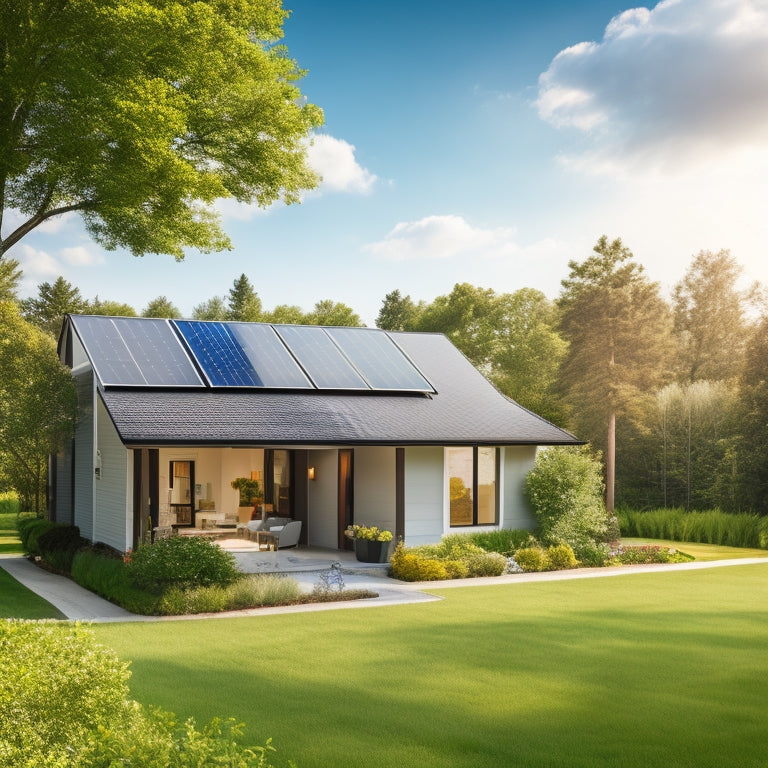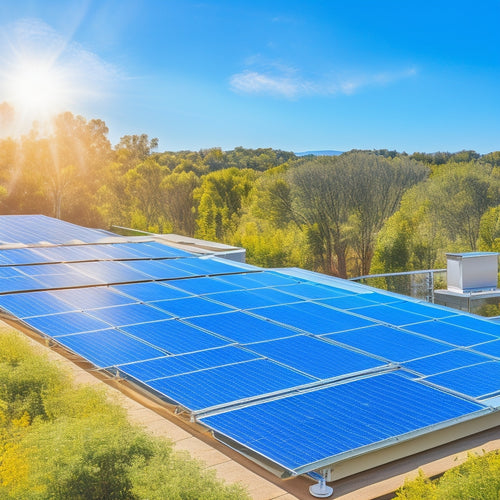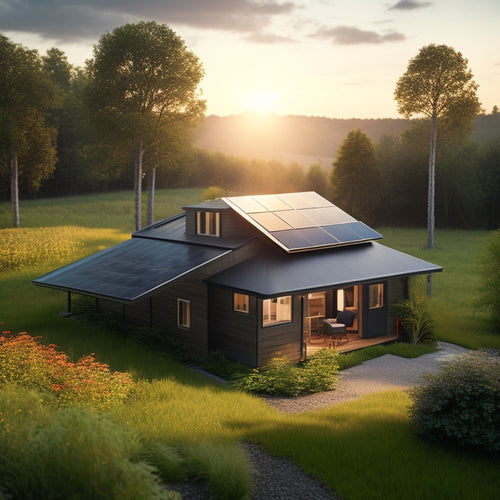
Boost Home Energy Independence With Solar Savvy
Share
By integrating solar power and energy storage systems into your home, you can greatly decrease your reliance on the grid and take control of your energy independence. To maximize your solar savvy, focus on utilizing solar power efficiently through high-quality panels, proper installation orientation, and shading mitigation strategies. Then, verify your energy storage system is up to par with regular battery maintenance, cost-effective solutions, and smart energy management. By optimizing your solar system's performance and maximizing your energy savings potential, you'll be well on your way to energy independence - and there's still more to investigate to take your solar setup to the next level.
Key Takeaways
- High-efficiency solar panels, proper installation orientation, and shading mitigation strategies can significantly boost energy independence.
- Implementing energy storage systems with suitable battery types and capacities can optimize energy distribution and reduce grid reliance.
- Regular solar panel maintenance, damage inspections, and energy monitoring tools ensure maximum energy absorption and system performance.
- Energy audits, cost analysis, and implementation of energy-efficient appliances and smart thermostats can minimize energy consumption and enhance independence.
- Load shifting and backup power capabilities can provide additional energy independence and comfort during outages.
Harnessing Solar Power Efficiently
Five key factors influence the efficient utilization of solar power: panel quality, installation orientation, shading mitigation, temperature control, and inverter performance.
You'll want to evaluate high-efficiency solar panel types, such as monocrystalline or bifacial panels, to maximize energy conversion. Proper installation orientation is vital, as it directly affects energy output.
Shading mitigation strategies, like trimming trees or using shading devices, can also improve efficiency. When designing and selecting solar energy systems, it's important to choose the right solar panels based on factors like panel efficiency, durability, and budget considerations.
Temperature control measures, such as cooling systems or thermal management, help maintain ideal panel performance.
Finally, high-performance inverters efficiently convert DC power to AC, ensuring maximum energy harvesting.
Home Energy Storage Essentials
As you optimize your solar power system, you're likely generating more energy than you need during the day. This excess energy can be stored for later use, reducing your reliance on the grid and increasing your home's energy independence.
Effective energy storage requires a solid understanding of the following fundamentals:
- Battery maintenance: Regularly inspect and maintain your batteries to guarantee they're operating at peak efficiency and extending their lifespan.
It's crucial to evaluate the cost of solar battery storage systems, which range from $5,000 to $15,000 or more, depending on the size and type cost overview. Proper maintenance can help minimize the impact of degradation, which typically occurs at a rate of 2-5% per year.
-
Energy management: Implement a smart energy management system to optimize energy distribution, prioritizing your energy needs and minimizing waste.
-
Load shifting: Shift non-essential loads to off-peak hours, reducing peak demand and strain on the grid.
-
Backup power: Confirm your system can provide backup power during outages, keeping your home safe and comfortable.
- System monitoring: Continuously monitor your energy storage system to identify areas for improvement and optimize performance.
Choosing the Right Battery
When it comes to choosing the right battery for your solar power system, your options are vast, and each type has its unique characteristics, advantages, and limitations.
You'll need to evaluate different battery types, such as lead-acid, lithium-ion, and sodium-ion, each with its own pros and cons.
Assessing energy needs is vital to determine the right capacity for your system, as it directly impacts the overall energy storage capacity.
Capacity considerations are also essential, as you'll need to determine how much energy you want to store and for how long.
Installation options, such as indoor or outdoor placement, will also impact your choice.
Finally, think about maintenance tips, like monitoring and updating your battery's software, to guarantee peak performance.
Maximizing Energy Savings Potential
By integrating your solar power system with smart home technologies, you can release the full potential of your energy savings.
This collaboration enables real-time monitoring and optimization of your energy usage.
To maximize your energy savings, consider the following strategies:
- Conduct energy audits to identify areas of inefficiency in your home
- Perform a cost analysis to determine the most cost-effective energy-saving solutions
- Implement energy-efficient appliances and lighting
- Employ smart thermostats to optimize your heating and cooling usage
- Take advantage of energy storage systems to optimize your energy usage during peak hours
Optimizing Solar System Performance
You've invested in a solar power system, and now it's vital to guarantee it's operating at its best. To optimize performance, regular solar panel maintenance is important. This includes cleaning panels to maximize energy absorption, inspecting for damage or debris, and trimming surrounding trees or vegetation to minimize shading.
Additionally, utilizing energy monitoring tools can help you track your system's performance in real-time, identifying any potential issues before they impact energy production. By staying on top of maintenance and monitoring, you can make certain your solar power system is running efficiently, maximizing your energy savings and independence.
Frequently Asked Questions
Can I Install Solar Panels on My Own or Do I Need a Professional?
You can attempt a DIY installation, but consider the risks: improper mounting, electrical shock, and voided warranties. It's recommended you hire a professional to guarantee a safe, efficient, and code-compliant installation that meets your local building requirements.
How Long Does It Take for Solar Panels to Pay for Themselves?
You'll find the payback period varies, but with financial incentives, solar panels typically pay for themselves within 5-7 years, depending on your energy usage, panel quality, and local policies, making the switch to clean energy a smart investment.
Are Solar Panels Affected by Pollution and Dust Accumulation?
You'll find that solar panels are indeed affected by pollution and dust accumulation, which reduces their efficiency; regular solar panel maintenance is essential to mitigate the dust impact, ensuring ideal energy output and prolonging their lifespan.
Can I Use Solar Power During a Grid Outage Without a Battery?
Imagine sitting comfortably in your home, surrounded by darkness, yet powered by the sun. Unfortunately, with traditional grid-tied systems, you can't use solar power during a grid outage without a battery. Opt for off-grid options to guarantee energy independence during outages.
Will Solar Panels Increase My Property Value?
You'll likely see an increase in your property value, as solar panels are viewed as a desirable feature in a property appraisal, aligning with current market trends that prioritize energy efficiency and sustainability.
Related Posts
-

What Types of Solar Energy Devices Are Available
You'll find several types of solar energy devices available today, each customized to different energy needs. Photovo...
-

Diy Off Grid Solar
By embracing DIY off-grid solar, you can break free from grid dependence, slashing your energy bills by up to 90% and...
-

Top Camping Water Bottles for Adventure
When you're out adventuring, picking the right camping water bottle is essential for staying hydrated. Look for durab...


